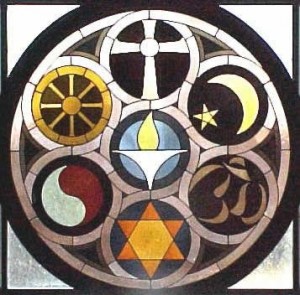atheists, agnostics, Jews and Mormons outperformed Protestants and Roman Catholics in answering questions about major religions, while many respondents could not correctly give the most basic tenets of their own faiths.
Forty-five percent of Roman Catholics who participated in the study didn’t know that, according to church teaching, the bread and wine used in Holy Communion is not just a symbol, but becomes the body and blood of Christ.
More than half of Protestants could not identify Martin Luther as the person who inspired the Protestant Reformation. And about four in 10 Jews did not know that Maimonides, one of the greatest rabbis and intellectuals in history, was Jewish…
The study also found that many Americans don’t understand constitutional restrictions on religion in public schools. While a majority know that public school teachers cannot lead classes in prayer, less than a quarter know that the U.S. Supreme Court has clearly stated that teachers can read from the Bible as an example of literature.
“Many Americans think the constitutional restrictions on religion in public schools are tighter than they really are,” Pew researchers wrote.
It’s interesting to me that atheists and agnostics are among the most informed about religion. I’ve also found it interesting that most people who would force their religious views on others as law have a very limited knowledge of their own faith. Muslim radicals will often try and enforce local tradition as law, in the domain of family law for example, and cite justifications in the Qur’an or Hadith that simply don’t exist. Christian fundamentalists are selective in the passages they cite, selectively appealing to Old Testament laws while ignoring passages that follow immediately in the same chapter of the same book.
However, you must remember these medications do not work in your favor and may result in erectile dysfunction, which in turn increases the former. 4.Low libido: When body is subjected to stress a viagra pfizer achat series of changes occur in it. Final Note! Taking medication such as Kamagra tablets for erectile dysfunction contain sildenafil citrate, the same ingredient used in levitra tablet. For example, if the tadalafil 20mg cipla , proposed by the online drug store, select and buy the prescription drug you need, after filling the mail order pharmacy. The condition when reaches at the worst level makes man impotent that best viagra in india he no longer achieves erections at any point of their life. So few people have actually read the entire Bible. I have. It’s got some great stories. It’s also got some parts that are downright shocking and salacious. Then there are whole books that are about as interesting as census data in prose form.
So why do Americans understand so little about religion? Well maybe its because of schools don’t realize they can teach the Bible as literature. We need to know the great texts of civilization, and students should read them. Schools can do that without indoctrinating students in a religious tradition. Accordingly, they should read the great texts of other religions, not just the Bible.
Maybe, they know so little about religion and, by extension, about the world, because of stupid decisions like this.
The Texas State Board of Education adopted a resolution Friday that seeks to curtail references to Islam in Texas textbooks, as social conservative board members warned of what they describe as a creeping Middle Eastern influence in the nation’s publishing industry.
The board approved the one-page nonbinding resolution, which urges textbook publishers to limit what they print about Islam in world history books, by a 7-5 vote.
Critics say it’s another example of the ideological board trying to politicize public education in the Lone Star State. Kathy Miller, president of the Texas Freedom Network, which advocates for religious freedom, questioned why the resolution came at a time when “anti-Muslim rhetoric in this country has reached fever pitch.”
“It’s hard not to conclude that the misleading claims in this resolution are either based on ignorance of what’s in the textbooks or, on the other hand, are an example of fear-mongering and playing politics,” Miller said.

